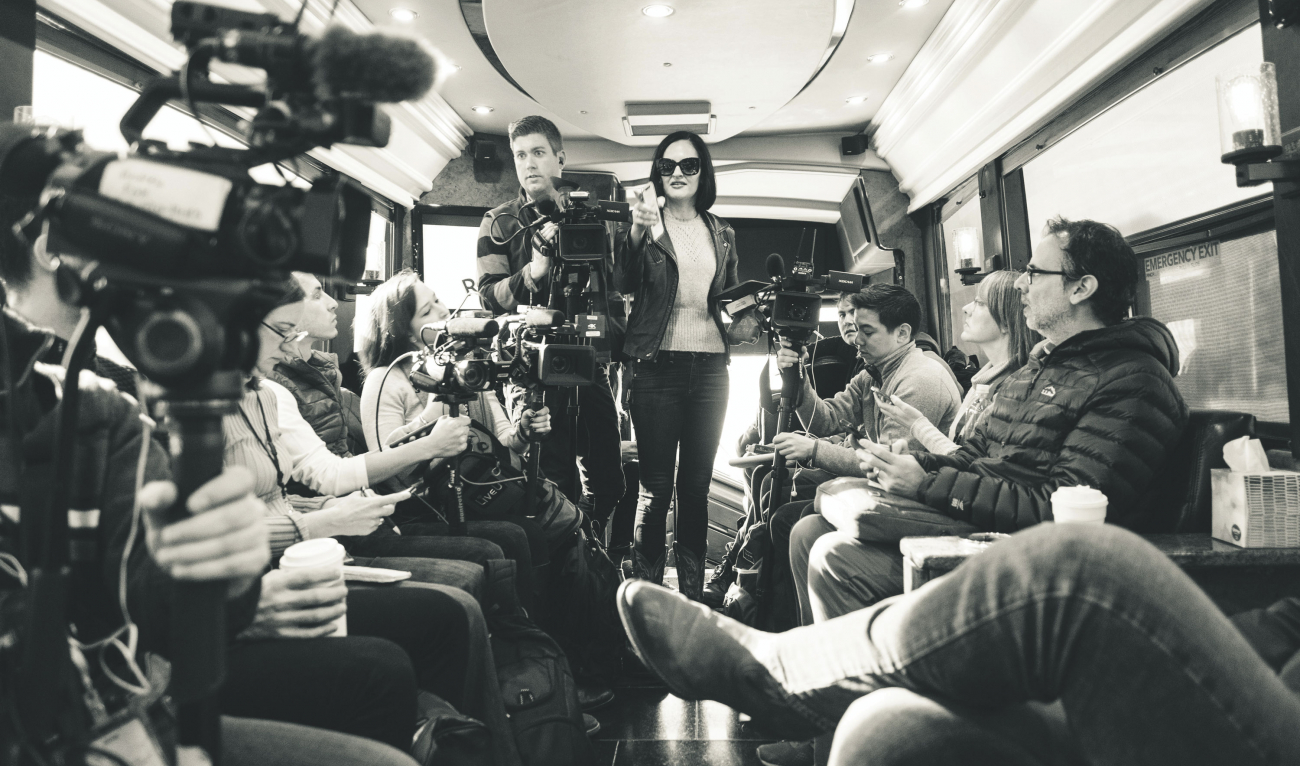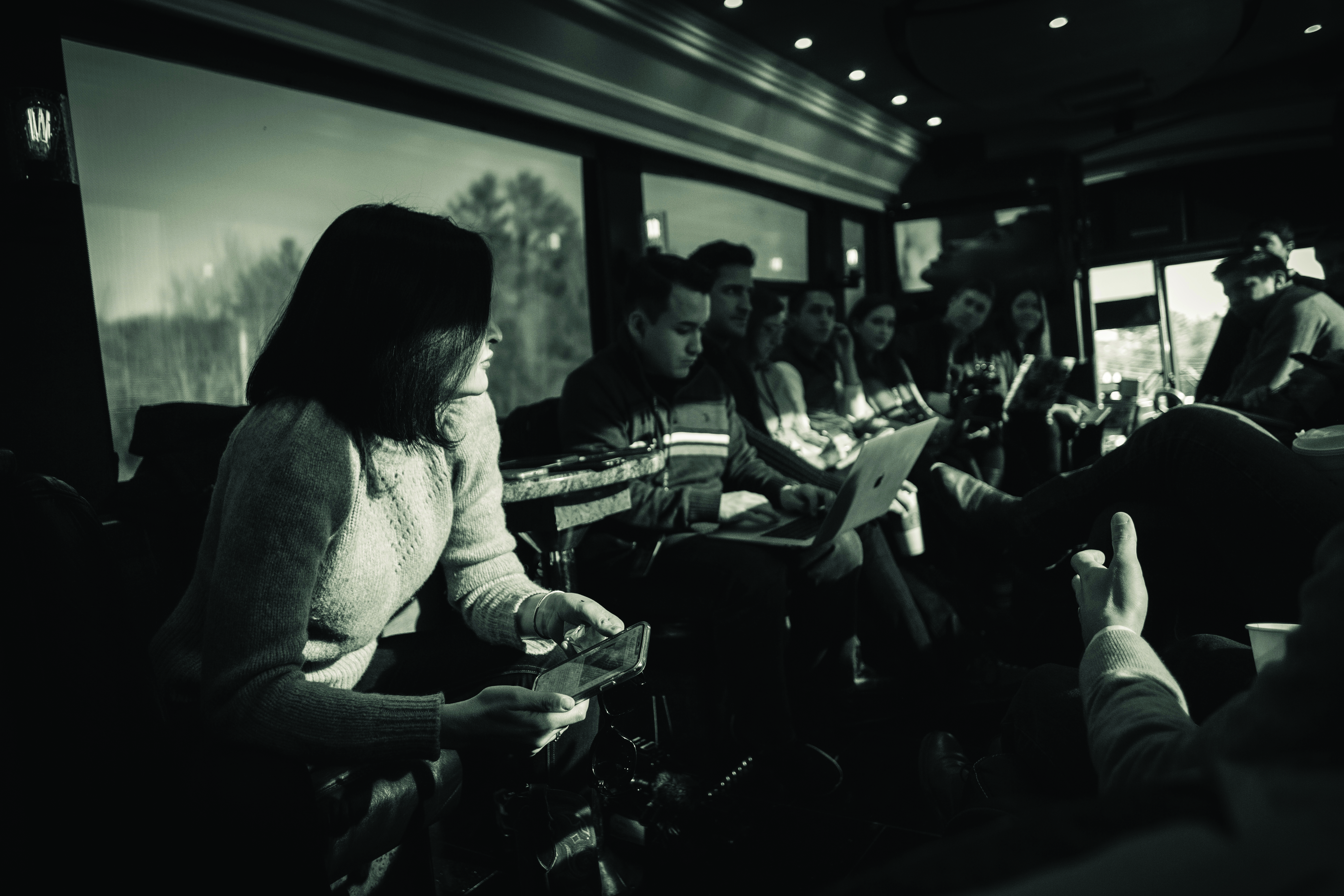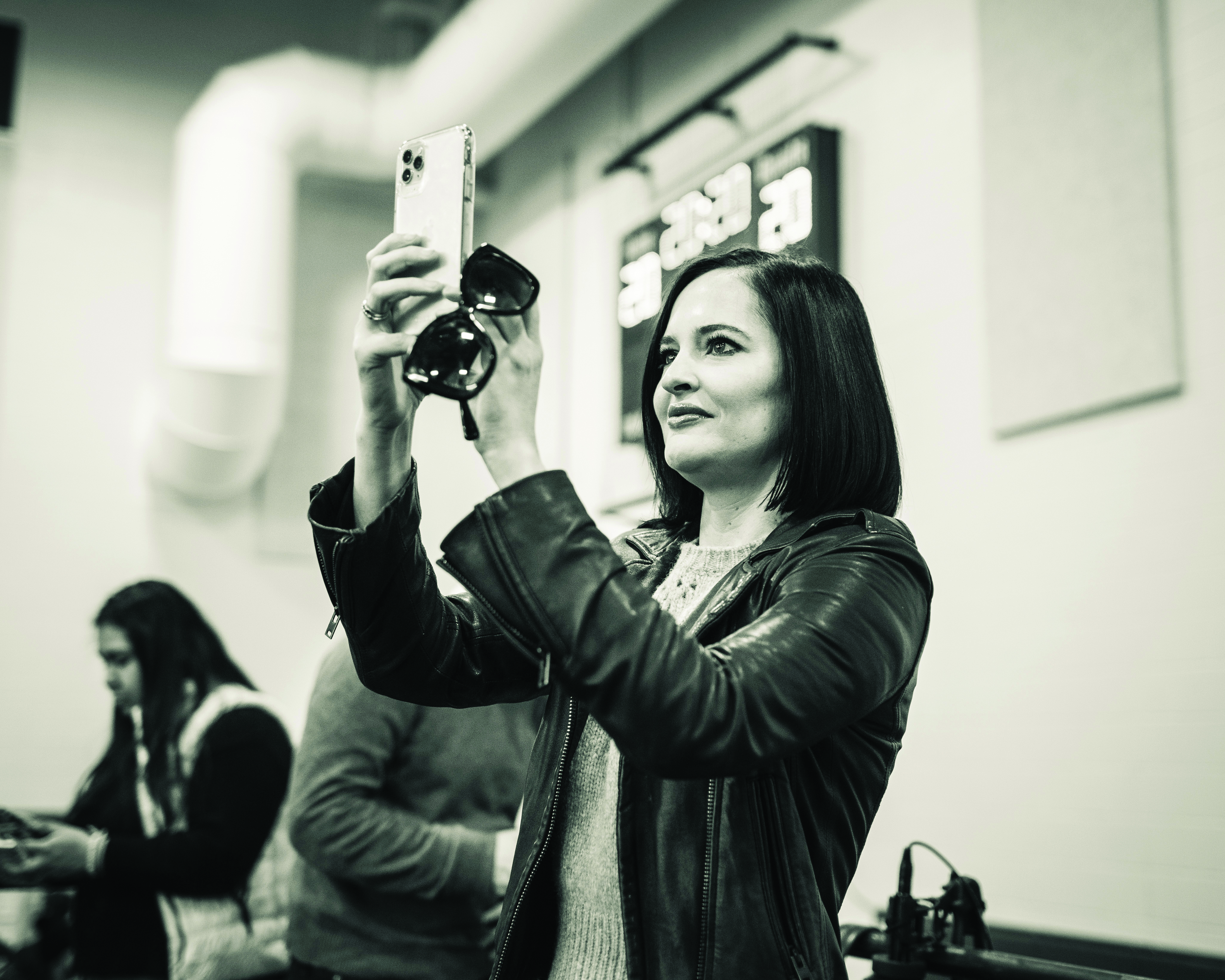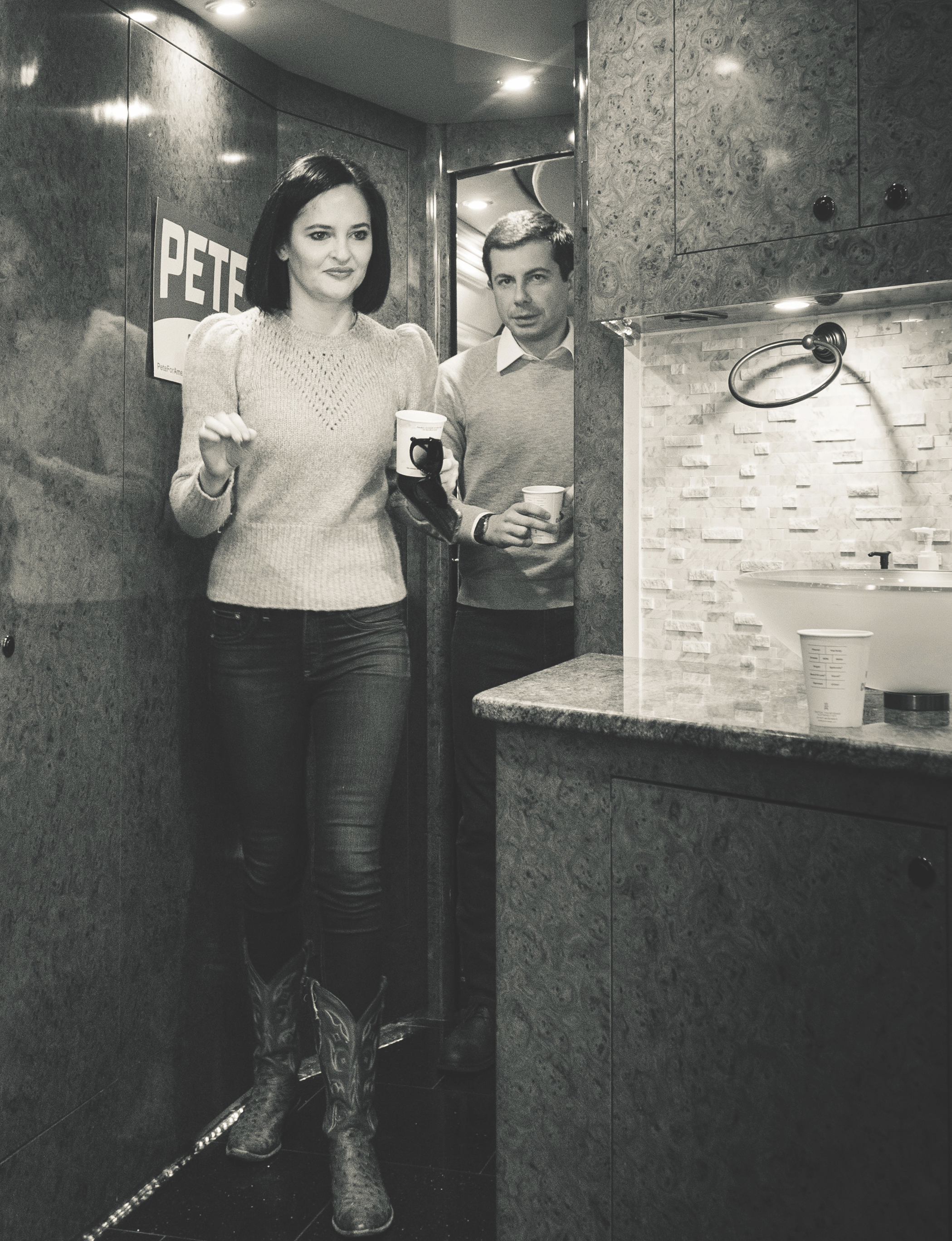Trail Blazer
The question—from an aide huddled on the sidelines of a recent Pete Buttigieg campaign event in Manhattan—seems benign. “Should we do Saturday and Sunday?” the aide asks, glancing at a calendar on her phone. The staff needs to strategize about when and where their boss should speak during an upcoming trip to Iowa.
A colleague rolls his eyes at the aide. “Uh oh,” he whispers. “She’s going to get the Lis Smith treatment.”
It didn’t take long. “No!” snaps Smith, 37, the campaign’s senior communications advisor—and a political operator whose instinct for clear messaging, quick timing, and maximum exposure has vaulted her to the top of her profession. “We’re on it Friday, Saturday, Sunday, and Monday. It’s got to be a multiday thing.”
It’s the stuff of legend in political circles, that treatment—an extended tongue-lashing about how the press treats candidates more favorably when they see more of them and not less. Smith has deployed the strategy across the country toward a singular goal since she was a precocious undergraduate: electing Democrats. Though Smith’s success has been mixed across 20 campaigns, her latest effort may be the most impressive. Buttigieg, who was a little-known, low-key Midwest mayor when the 2020 campaign began, has catapulted to the top tier of the White House race.
“She is arguably the most talented political communications operative in the party today,” says Jeff Smith (no relation), a former Missouri state senator and former Dartmouth visiting lecturer. “And she understands how political communications plays out on the ground.”
Buttigieg, 37, came to Smith’s attention in 2016, when the two-term mayor of South Bend, Indiana, was angling to become the chairman of the Democratic National Committee. Though that effort fizzled, Smith, who had taken him on as a client, became spellbound by Buttigieg—a Harvard-educated Rhodes Scholar and gay millennial war veteran who hails from a Rust Belt battleground—and his calm way of speaking, which she describes as “more Xanax than Red Bull.”
“Working in politics, you always hear about the moment when you meet ‘The One.’ And he was the first person where I was like, ‘holy shit,’ ” Smith says over lunch at a café in midtown Manhattan. As she picks at a spinach pie and downs a beer, Smith comes across as much softer and more patient than she does in a crowd and in some portrayals. She draws on a napkin to show how fundraising prowess will help winnow the Democratic field. Her upspeak, the patois of millennials, adds a youthful charm. But for every “like,” there’s a strong opinion backed by personal examples.
When Buttigieg launched his campaign in April 2019, Smith was one of only a skeleton crew of three staffers. She was also its oldest member. Short-staffed and handling someone who was the opposite of a brand name, Smith embraced an all-press-is-good-press battle plan, pitching her client to media outlets that weren’t used to that kind of outreach: fashion magazines, environmental newsletters, and sports and entertainment websites.
Following in Sen. Bernie Sanders’ footsteps, Buttigieg also crossed enemy lines, at least in the eyes of many Democrats, to appear on Fox News for a town hall. “The reason Donald Trump won is because he saturated the media environment. Sometimes he would totally bomb, but even in bombing, he knew he was going to dominate the conversation,” Smith says, before realizing how that sounds and qualifying her hat tip. “That’s a compliment to the strategy, not the man.”
The strategy may have limits. Last summer Smith booked Buttigieg on a national country music radio show to deliver his message to red state listeners. But before airtime, the show’s owner, Cumulus Media, pulled the plug on the interview over concerns it might run afoul of federal laws prohibiting stations from favoring one candidate over others.
“First and foremost, the most defining thing, and the simple but smart choice, was to make Mayor Pete so available,” says Sam Stein ’04, the politics editor of The Daily Beast website who worked with Smith in college through the group known today as the Dartmouth College Democrats. A feather in their cap was getting Sen. John Edwards to stump on the lawn of the Alpha Delta house when he was campaigning for the Democratic presidential nomination in the 2004 cycle. (“We got the house cleaned up, hid the beer cans, and got fruit platters,” says Stein, then an AD brother. “But he wouldn’t step foot in the house.”) Most political advisors, according to Stein, limit all but essential media contacts, afraid of candidates putting their feet in their mouth. Others worry that pushing a candidate so forcefully early in a two-year contest runs the risk of having him peak too soon.
“In our ubiquitous media culture,” Stein says, “the only way for a candidate to break through is to put him out there.” This is particularly true in an election cycle that began with more than 20 Democratic presidential candidates.
Buttigieg has broken through. In the most recent example of fundraising prowess, Buttigieg hauled in $19.1 million in the third quarter of 2019, good enough for a third-place finish. The only two Democrats to top him were Sen. Bernie Sanders, who collected $25.3 million, and Sen. Elizabeth Warren, with $24.6 million. Joe Biden finished fourth with $15.2 million. Political analysts have generally given Buttigieg good marks for his debates, too.
It hasn’t all been smooth for Buttigieg. In June a white police officer in South Bend shot and killed a black man after a report of someone breaking into cars. Leaving the campaign trail for an extended period to deal with the crisis, the candidate had to defend his record to his city’s sizable black community, with which he has had strained relations. The mayor did not try to make amends behind closed doors, Smith points out. He did so in public, in front of jeering crowds and reporters who captured the tense exchanges.
“I have a hard time believing that a lot of other candidates would have done what he did, to face it head on,” says Smith, who helped shape Buttigieg’s response. “That has been a really, really tough story line. But he’s still here.”
Politics seemed preordained for Smith, who grew up in affluent Bronxville, in Westchester County outside New York City. Both her father, Thomas, and mother, Adrienne, were lawyers. Thomas’s great-uncle was Sam Ervin Jr., the North Carolina senator who chaired the Watergate investigation that helped topple President Richard Nixon. Adrienne’s stepfather, David Schaffer, a longtime town leader in Franconia, New Hampshire, frequently gave town tours to candidates such as Ronald Reagan, Jimmy Carter, and Ted Kennedy. When Smith was in kindergarten, she says, coverage of the 1988 Dukakis-Bush presidential race ignited a spark. “I was a f****** nerd,” says Smith, who isn’t afraid to let salty language rip in the presence of reporters.
Four years later, when Bill Clinton was elected, much of the Smith clan headed to Washington for his inauguration, a multiday trip. “Politics was part of the fabric of our family,” says Smith’s twin brother, Angus, a biopharmaceutical company executive who generally supports his sister’s candidates. Soon after, Lis wrote about James Carville, Clinton’s consigliore, for a grade-school assignment about who she wanted to be when she grew up. “He was hard-hitting and totally different, not a buttoned-up kind of guy,” she says.
Unlike Dartmouth applicants who cram their resumes with leadership positions, Lis didn’t gravitate toward student council-type roles, according to Angus. “She never showed much interest in being the story,” he says. “I think she enjoys playing chess in the background.”
Yet it’s clear that her will to win is fierce. On vacation in Tahiti when they were 12, Lis and Angus were swimming in the ocean when, according to Angus, a 10-foot shark swam up, which sent them racing for their boat. Angus reached a ladder before Lis. But she yanked him back into the water so she could climb to safety first.
Far from being embarrassed, Lis laughs about the anecdote. “She enjoys telling that story as much as I do,” Angus says. “That’s just who she is.”
Smith double majored in government and anthropology, and she briefly played violin in the chamber orchestra. Though not keen on sororities, she wasn’t afraid to party in frat basements. “I drank my body weight in beer every Wednesday, Friday, and Saturday night,” she says. Sometimes in high heels, too.
Smith spent summers and off-terms honing her trade. She knocked on doors in New Hampshire and fired off letters to editors as part of Jeanne Shaheen’s failed first bid for the U.S. Senate.
Later jobs had Smith, who has lived in eight states, canvass as an undergrad for senators John Edwards, Claire McCaskill, and Tom Daschle, and not always on friendly terrain. Indeed, while going “farm to farm” outside Flandreau, South Dakota, in Daschle’s unsuccessful 2004 re-election campaign, a German shepherd attacked Smith. Injured and panicked, she drove back roads to the nearest hospital, which was 40 minutes away. “I had the nastiest bruise for a couple weeks,” she says. Back in Flandreau, Daschle confided to her that he was once bitten by a dog while campaigning, and that it was a rite of passage.
All those off-campus, real-world lessons made her an impressive student, says Jeff Smith, the Dartmouth instructor who arrived in Hanover in 2004 to teach a class in elections after a bruising congressional defeat in Missouri. Among his students that winter was Lis, who whirled in on the first day with some pull-no-punches tales about a U.S. senator. The anecdote “evinced a great deal of insider knowledge and was more than a little off-color,” says Jeff, who demurs when asked for the name of the pol.
“Within 90 seconds I could tell this was one of the most savvy and politically sophisticated undergraduates I had ever encountered,” he says. “And one of the most irreverent.”
That she suffered no fools gladly was apparently attractive. The following spring Smith and Smith began dating, which continued for about four years, before ending around the time Jeff pled guilty to two counts of obstruction of justice for a campaign violation during his failed congressional bid and reported to prison. Lis and her family visited Jeff behind bars in Kentucky and were “very supportive during a dark time,” says Jeff, now executive director of the Missouri Workforce Housing Association, an advocacy group. “That showed a lot of character.”
In 2012 Lis directed President Barack Obama’s rapid-response team for his re-election effort. In 2016 she was deputy campaign manager for Martin O’Malley, the Democratic governor of Maryland who ran for the White House. “She would just get in her car and drive to wherever,” says Nina Edelman ’05, a friend and college roommate.
Smith had no mentors. To become a gun-for-hire spin doctor—a field with few Dartmouth alums or women, Smith notes—she cut her own path. “Her business has been built brick by brick, beer by beer, road trip by road trip,” Edelman says. “I give her such credit for that.”
In a world where those who run for office usually command more attention than behind-the-scenes operatives, Smith, unusually, often finds herself in the limelight.
Bounding in to that morning campaign event in Manhattan wearing a black dress and animal-print pumps, a copy of The New York Post sticking out of her Hermes bag, Smith quickly attracts a fan. “I just had to meet you,” gushes Gabrielle Pacia ’16, a law student who had learned about Smith from a magazine.
But attention can cut both ways. In 2013 Smith signed up to work for Eliot Spitzer, the New York governor who had resigned a few years earlier in a prostitution scandal. Attempting a comeback, Spitzer was competing to be New York City’s comptroller, a race he lost. Smith and Spitzer, who was separated but not divorced from his wife at the time, began dating. The tabloids pounced. Photographers staked out Smith’s Manhattan apartment for a shot of the couple, and one paper slammed her with a Christmas-week front page that blared “Ho! Ho! Ho!” Soon after, mayor-elect Bill de Blasio, who was expected to appoint Smith as his press secretary, yanked the offer, apparently cowed by the bad publicity.To family and friends, the move smacked of a sexist double-standard: If a male campaign worker dated a female politician, the relationship would be accepted and even lauded. “Why was she called a ‘ho’ on the cover of a paper when she was an adult in a consensual relationship?” Edelman asks. “But I think that gives her empathy and makes her better at her job.”
Smith looks back at that time and winces. “When you’re under the microscope, it sucks. It can feel like the world is ending,” she says. “No one should have to go through something like that.” Unbowed by the attacks, she dated Spitzer for several years, locking lips with him in view of the cameras at Knicks games and showing him around Hanover during reunions in 2014—including a stop at Psi U for pong.
Buttigieg says he’s glad that Smith arrived battle-tested, aware of how difficult it can be to be the subject of a string of negative stories but aware that these things, too, shall pass. That perspective helped with the South Bend police controversy, he adds. “This isn’t just a sort of academic or professional exercise for her,” the candidate says as he walks from an event to his hotel through the skinny streets of Manhattan’s financial district, attracting honks as he goes. “She knows in a personal way what it is to be in that kind of glare, and I do think that makes her advice much richer.”
Despite all the paparazzi and press scrums and Pennsylvania Avenue aspirants, Smith, who is single, considers herself a bit socially awkward. She says she’s more comfortable with her two cats than hanging out in crowds. “Small talk is hell to me,” she says. “I’m really just an introverted person in an extrovert’s job.”
If Buttigieg envisions Smith as his future press secretary, he isn’t saying. “I think she will be a force for the rest of both of our professional lives,” he says, adding, “She’s an example of how, often, the role fits the person rather than the other way around.”
And Smith, who knows something about the fickleness of political fates, is also mum about where she sees herself in January 2021. “I’m just trying to get through this race,” she says. “I learned a long time ago that things can change on a dime.”
C.J. Hughes is a DAM contributing editor. He lives in New York City.














